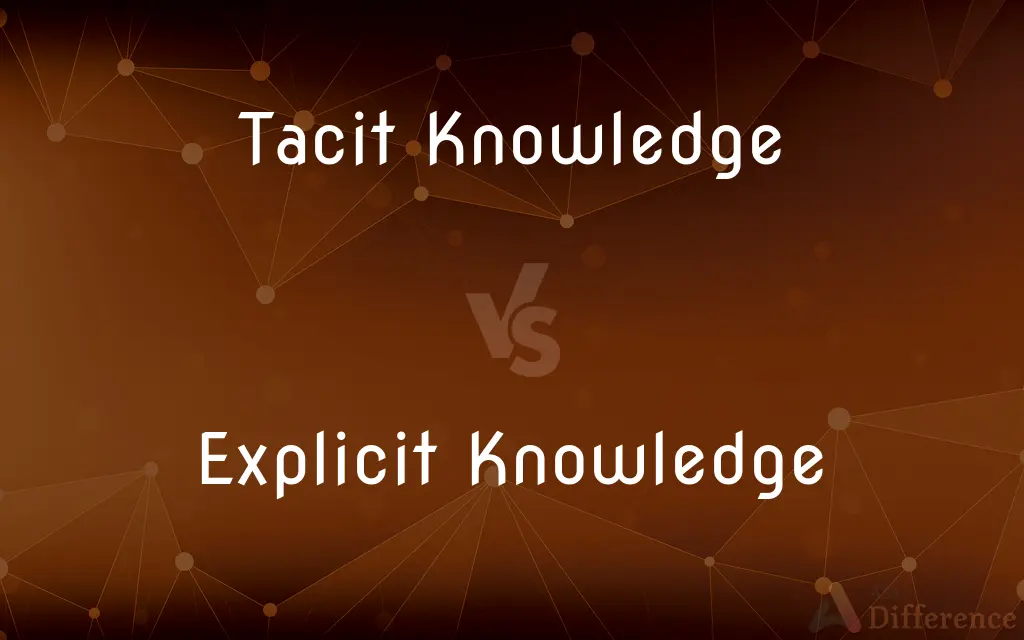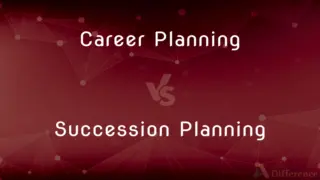Tacit Knowledge vs. Explicit Knowledge — What's the Difference?
By Tayyaba Rehman — Published on October 10, 2023
Tacit Knowledge is personal, context-specific knowledge that's hard to articulate, while Explicit Knowledge is formalized and easily shared through language and documentation.

Difference Between Tacit Knowledge and Explicit Knowledge
Table of Contents
ADVERTISEMENT
Key Differences
Tacit Knowledge and Explicit Knowledge are two pivotal concepts in the realm of knowledge management, each serving a distinct function. Tacit Knowledge embodies that which is understood or known but difficult to articulate or express in words. It's the type of knowledge that's often gained from personal experience or insights and is deeply embedded in individual cognition. For instance, the intuition or 'gut feeling' a seasoned manager might have about a business decision is a manifestation of Tacit Knowledge.
Explicit Knowledge, in contrast, is knowledge that has been or can be articulated, codified, and stored in certain media. It is amenable to communication or distribution and can be systematically organized. Think of Explicit Knowledge as the manuals, databases, or any documented procedures that a company might possess. A set of guidelines for operating a machine is an example of Explicit Knowledge.
While both forms of knowledge have immense value, Tacit Knowledge is inherently more challenging to capture and share due to its subjective and intangible nature. Explicit Knowledge, with its definitive structure, can be easily disseminated across individuals or organizations. However, the real challenge often lies in converting Tacit Knowledge into an explicit form to harness its full potential.
Conversely, while Explicit Knowledge can be easily accessed and transferred, it lacks the nuanced understanding or depth that Tacit Knowledge offers. Recognizing and valuing both these types of knowledge is crucial for an organization's growth and innovation.
Comparison Chart
Nature
Intangible and subjective.
Tangible and objective.
ADVERTISEMENT
Transferability
Difficult to communicate or share.
Easily shared through documentation or instruction.
Source
Personal experience, intuition, and insights.
Manuals, databases, documented procedures.
Example
Riding a bike.
A manual on how to assemble a bike.
Accessibility
Gained through direct experience or interaction.
Can be accessed anytime from documented sources.
Compare with Definitions
Tacit Knowledge
Implicit knowledge not easily expressed.
Through years of practice, chefs acquire Tacit Knowledge about flavors and techniques.
Explicit Knowledge
Systematic and easily transferable knowledge.
She referred to the manual for the Explicit Knowledge needed to operate the software.
Tacit Knowledge
Knowledge hard to formalize or articulate.
Despite her expertise, she found it hard to convey her Tacit Knowledge to novices.
Explicit Knowledge
Knowledge that's documented and structured.
The company's database is full of Explicit Knowledge on product specifications.
Tacit Knowledge
Knowledge based on personal experience and intuition.
Her Tacit Knowledge in customer interactions was invaluable to the company.
Explicit Knowledge
Knowledge codified for distribution or storage.
The research findings became part of the organization's Explicit Knowledge.
Tacit Knowledge
Context-specific insights not systematically organized.
His Tacit Knowledge of local customs greatly benefited the team during the trip.
Explicit Knowledge
Articulated knowledge that can be communicated.
Training programs aim to impart Explicit Knowledge to new employees.
Tacit Knowledge
Understandings internalized from direct involvement.
As a native speaker, he possessed Tacit Knowledge of the language's nuances.
Explicit Knowledge
Objective knowledge separated from the knower.
Universities are repositories of Explicit Knowledge across various disciplines.
Common Curiosities
What is Tacit Knowledge?
Tacit Knowledge is personal, context-specific knowledge that's hard to articulate or express.
Why is it hard to transfer Tacit Knowledge?
Due to its personal, subjective nature and reliance on personal experiences and contexts.
Is Tacit Knowledge less valuable because it's hard to share?
No, both forms of knowledge are essential, with Tacit Knowledge often offering depth and nuance.
Is Explicit Knowledge always factual and accurate?
Not necessarily. While it's structured, the accuracy depends on the source and validation.
How can organizations capture Tacit Knowledge?
Through mentorship, discussions, and encouraging employees to document insights and experiences.
How is Explicit Knowledge different from Tacit Knowledge?
Explicit Knowledge is formalized and can be easily shared through documentation, unlike the subjective nature of Tacit Knowledge.
Can Tacit Knowledge be converted to Explicit Knowledge?
While challenging, through documentation, training, and systematic reflection, it's possible.
Is all documented knowledge considered Explicit Knowledge?
Generally, if the knowledge is articulated and documented systematically, it's considered Explicit Knowledge.
How do experts use Tacit Knowledge?
They often rely on intuition, insights, and unspoken understandings in their expertise areas.
Can technology help in capturing Tacit Knowledge?
Yes, through AI, knowledge management systems, and collaborative tools.
Why is Explicit Knowledge essential for businesses?
It ensures consistent procedures, training, and provides a knowledge base for decision-making.
How is Tacit Knowledge related to wisdom?
Wisdom often encompasses deep Tacit Knowledge gained over time and varied experiences.
Can Explicit Knowledge become Tacit over time?
Yes, as people internalize and practice what they learn, it can become part of their Tacit Knowledge.
What's an example of Tacit Knowledge in everyday life?
The skill of riding a bicycle, which is hard to explain but learned through experience.
Is Explicit Knowledge static?
No, as more insights are gained, Explicit Knowledge can evolve and expand.
Share Your Discovery

Previous Comparison
Beat vs. Pulse
Next Comparison
Career Planning vs. Succession PlanningAuthor Spotlight
Written by
Tayyaba RehmanTayyaba Rehman is a distinguished writer, currently serving as a primary contributor to askdifference.com. As a researcher in semantics and etymology, Tayyaba's passion for the complexity of languages and their distinctions has found a perfect home on the platform. Tayyaba delves into the intricacies of language, distinguishing between commonly confused words and phrases, thereby providing clarity for readers worldwide.
















































